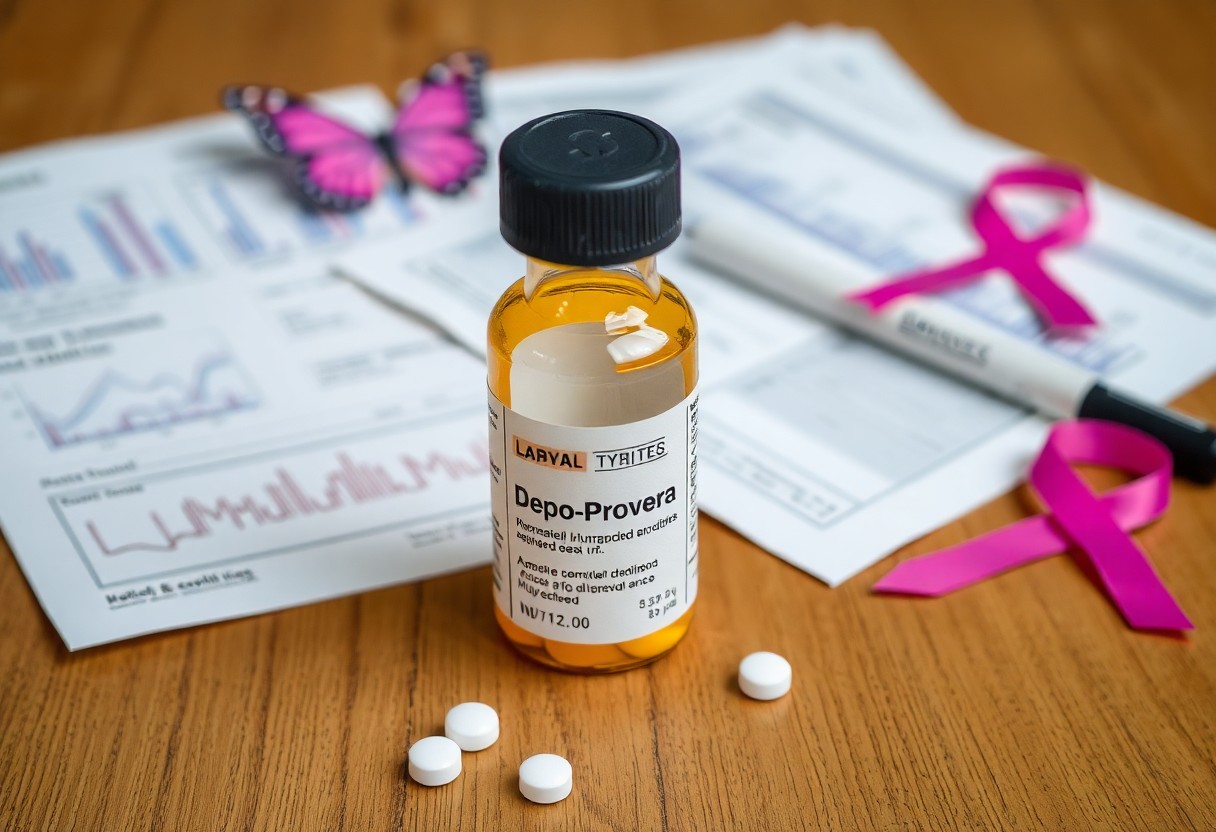With increasing awareness about Depo-Provera and its potential side effects, it’s necessary to examine the legal frameworks surrounding this contraceptive method. You may be concerned about the informed consent practices and whether your rights are fully protected when using this medication. Understanding the nuances of legal reform can empower you to advocate for safer and more transparent healthcare options. This post explores what changes are necessary to ensure that you and other users are adequately informed and protected in the face of documented risks associated with Depo-Provera.
Overview of Depo-Provera
Your understanding of Depo-Provera is fundamental when considering its role in reproductive health. Approved by the FDA in 1992, this injectable contraceptive provides a convenient option for preventing pregnancy. Administered once every three months, it delivers the hormone progestin to suppress ovulation and alter the uterine lining. Knowing its benefits and potential risks is important for making informed decisions about reproductive choices.
Mechanism of Action
Along with preventing ovulation, Depo-Provera thickens cervical mucus, making it more difficult for sperm to enter the uterus. This dual action effectively reduces the chances of fertilization. Additionally, it alters the endometrial lining, preventing implantation of a fertilized egg. Understanding these mechanisms can help you fully appreciate how this contraceptive works to ensure effective pregnancy prevention.
Common Uses and Benefits
Behind its primary use as a contraceptive, Depo-Provera offers several benefits for individuals seeking long-term birth control. It is particularly advantageous for those who prefer not to take a daily pill or have a contraindication to estrogen. Depo-Provera can also help manage menstrual symptoms and conditions like endometriosis.
And while considering Depo-Provera, you may appreciate the convenience of its quarterly injections, which eliminate the daily reminders that oral contraceptives require. Additionally, it offers reduced menstrual bleeding and even relief from painful periods, making it a viable option for many. Do not forget, however, that while it is effective for pregnancy prevention, its side effects can include weight gain and decreased bone density, making it important to consult with your healthcare provider to determine if this method aligns with your health needs.

Legal Status of Depo-Provera
One of the most discussed aspects of Depo-Provera is its legal status across various countries. The approval and regulation processes differ significantly, impacting your access to this contraceptive method. It’s important for you to be aware of these variations to navigate the healthcare system effectively.
Current Regulations
Behind the scenes, the regulatory landscape for Depo-Provera is complex. In many countries, it is classified as a safe contraceptive method and is widely available, while in others, access may be limited due to stringent laws or lack of awareness among healthcare providers. This inconsistency can affect your experience and choice.
Global Perspectives
Behind the differing regulations lies a broad spectrum of cultural attitudes and healthcare infrastructures. This diversity affects how you access and use Depo-Provera, making it imperative to understand these global perspectives.
Considering the global perspectives on Depo-Provera, various nations exhibit disparities in access, safety evaluations, and contraceptive education. For instance, in some regions, strict regulations may hinder availability, while in others, comprehensive programs promote informed choices. Furthermore, cultural stigmas around contraceptives can lead to misinformation, affecting your ability to make informed decisions. To ensure your health and reproductive rights, it’s vital to stay informed about how these factors might influence your experience with Depo-Provera.
Side Effects and Risks
You may experience various side effects and risks when using Depo-Provera, which is crucial to understand before starting this contraceptive method. While some women tolerate it well, others report a range of reactions that can influence their well-being and decision to continue its use.
Short-term Effects
Side effects of Depo-Provera in the short term can include irregular bleeding, weight gain, headaches, and mood changes. These symptoms may vary in intensity and duration, often prompting you to weigh the benefits of contraception against the discomfort of these potential reactions.
Long-term Implications
Across long-term use, Depo-Provera may lead to significant health implications, including potential bone density loss and alterations in fertility. Understanding these risks ahead of time can help you make informed choices about your reproductive health.
Risks associated with extended use of Depo-Provera include decreased bone mineral density, which can lead to a higher risk of fractures later in life, particularly in women over 30. Additionally, it is crucial to acknowledge that some users may experience delayed return to fertility after discontinuation, with some women taking several months to conceive. On a positive note, others appreciate the convenience of not having to remember daily pills and the reduced risk of ovarian and endometrial cancers. Understanding both the risks and benefits is vital for your long-term health planning.
Accessibility and Equity Issues
After considering the availability of Depo-Provera, it becomes evident that significant accessibility and equity issues affect those seeking this contraceptive method. Barriers to obtaining care often disproportionately impact marginalized communities, creating disparities that must be addressed to ensure equal health opportunities for all.
Barriers to Access
To truly understand the challenges faced by individuals seeking Depo-Provera, you must recognize the various obstacles that hinder access. These can include a lack of healthcare providers, limited insurance coverage, and the stigma surrounding reproductive health services, all of which can prevent you from receiving the medication you need.
Impact on Different Demographics
Accessibility continues to significantly affect various demographics in today’s society. Understanding that factors such as race, income, and geography play a vital role in your access to Depo-Provera can help shed light on these inequities. For instance, individuals from low-income backgrounds or those living in rural areas may find it especially challenging to locate and afford this method of contraception, ultimately influencing their ability to make informed decisions about their reproductive health.
Understanding the impact of these demographics requires recognition of how systemic inequalities shape healthcare access. For instance, you may belong to a community where healthcare facilities are scarce, making it difficult to receive consistent care. Moreover, financial constraints can further limit your choices, pushing you toward less effective or potentially harmful contraceptive options. These factors highlight the urgent need for reforms that address barriers in healthcare access, ensuring equity in reproductive health services for everyone.
Call for Legal Reform
All around the world, the pressing need for legal reform concerning Depo-Provera has become apparent. You may be aware that many women have experienced negative side effects and health complications, yet current regulations often lack necessary oversight and accountability. It is vital for the law to adapt to the realities of women’s health, ensuring access to comprehensive information and informed consent. Advocating for change allows you to contribute to better health outcomes for yourself and others.
Proposed Changes
After reviewing existing policies, several proposed changes aim to enhance safety and transparency. These include imposing stricter guidelines on informed consent and developing comprehensive education programs surrounding Depo-Provera. You should also advocate for regular monitoring of side effects and mandatory reporting of complications to ensure women’s health is prioritized in the legal framework.
Stakeholder Perspectives
Proposed reforms emphasize the diverse stakeholder perspectives vital for effective legal change. You should understand how healthcare providers, patients, and policymakers all play distinct roles in this discussion. Balancing these perspectives can create a more equitable system, including physician accountability and patient rights, leading to improved health outcomes for women using Depo-Provera.
Legal reform can only advance when all *stakeholder perspectives* are acknowledged and integrated into policy-making. You may be surprised to learn that healthcare providers often express concern over inadequate patient education regarding Depo-Provera’s potential side effects, while patients highlight the need for better support systems. Engaging with advocacy groups and legislative bodies is necessary to ensure that patient voices are not only heard but actively shape the future of reproductive health laws. Addressing the unique experiences and needs of all stakeholders will facilitate a balanced approach to reform.
Case Studies
Now, let’s explore a few significant case studies that highlight the impact of Depo-Provera and the need for legal reform:
- 1. A study with over 500 women reported severe side effects, including loss of bone density.
- 2. 30% of users experienced substantial weight gain leading to health complications.
- 3. In Australia, legal actions resulted in $1 million settlements due to inadequate warnings.
- 4. European countries saw a 40% reduction in usage after increased education on risks.
Successful Reforms in Other Countries
Along your journey to understand the implications of Depo-Provera, you may find that other countries have successfully enacted reforms. For instance, nations that have mandated comprehensive patient education and mandatory risk disclosures have significantly lowered the rates of adverse effects and improved informed consent practices.
Lessons Learned
Around the globe, the stories of women affected by Depo-Provera reveal vital lessons for reform. These stories demonstrate the gap in patient education and the potential dangers of inadequate information. By taking a closer look at the experiences of women who faced serious health issues, you can identify what needs to change in legislation.
Reforms are necessary to enhance informed consent and patient education regarding Depo-Provera. Stakeholders need to prioritize providing thorough information on potential side effects that may not be adequately communicated. This includes understanding that while some women might benefit from the contraceptive, others may experience significant risks. You can advocate for legal changes that require healthcare providers to discuss the risks and benefits thoroughly, ensuring that you and others can make well-informed decisions about your health options.
Final Words
So, as you explore the complexities surrounding Depo-Provera and the need for legal reform, consider how these changes can enhance patient safety and informed consent. Your understanding of the potential risks and benefits will empower you to advocate for yourself and others. Engaging with policymakers and healthcare providers can drive the crucial discussions needed for regulations that prioritize transparency and accountability in reproductive health. By staying informed and involved, you contribute to a collective movement that seeks to improve the standards and practices surrounding contraceptive options.


















